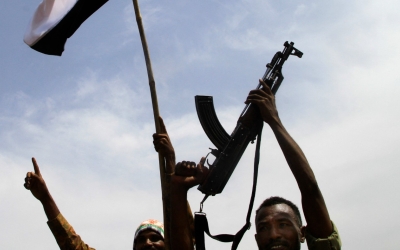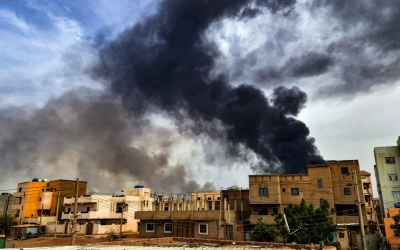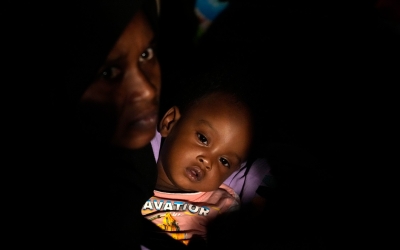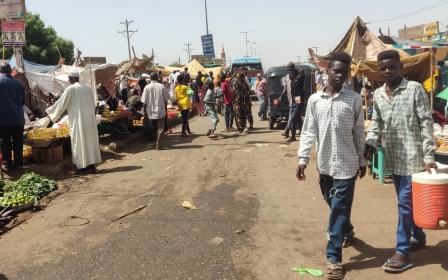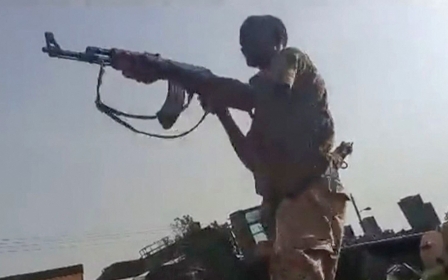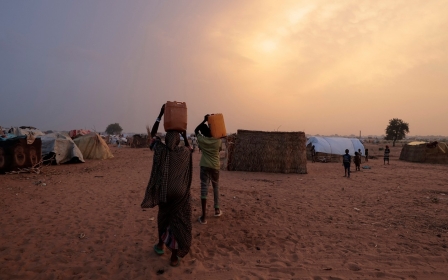Sudanese take up arms against RSF as army begins to push back
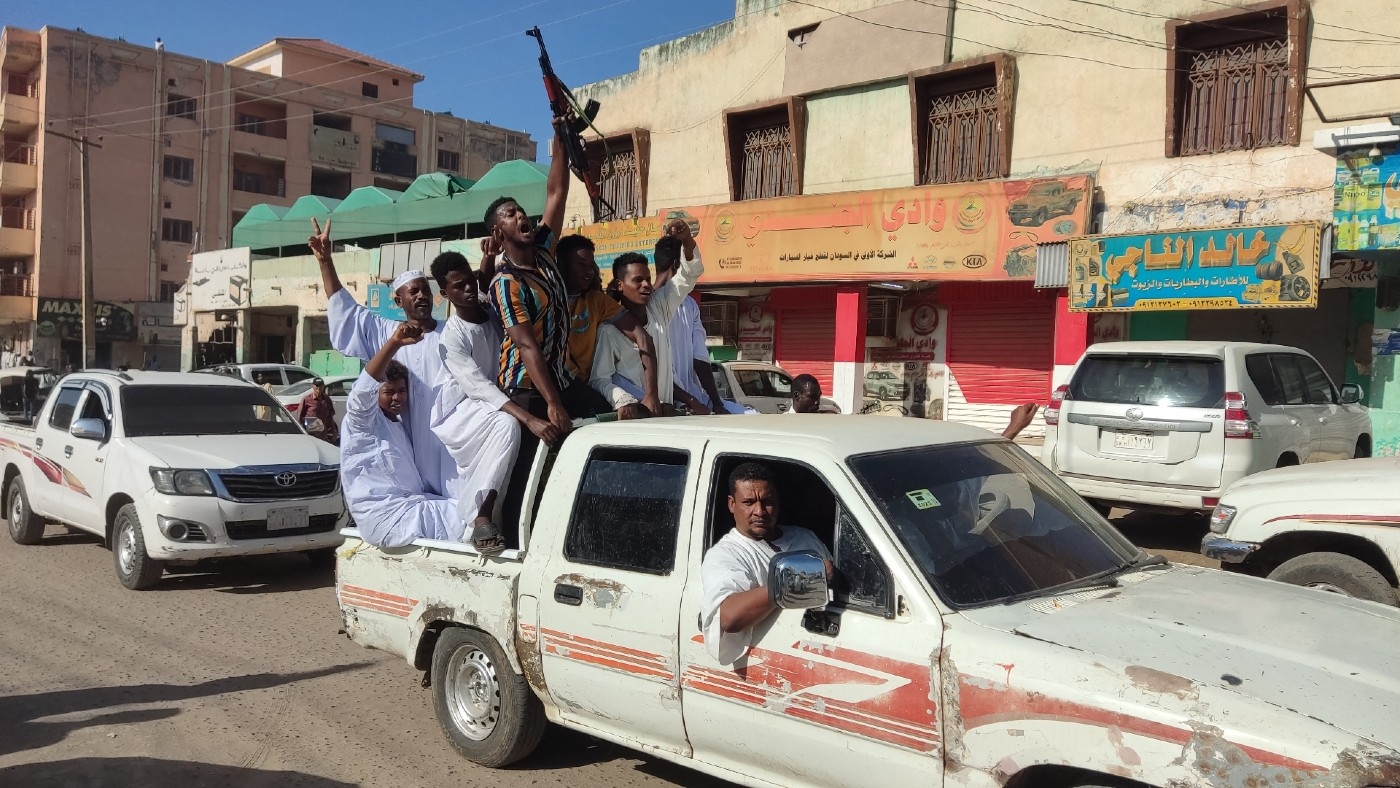
Thousands of Sudanese civilians have taken up arms against the Rapid Support Forces (RSF) paramilitary, which now controls about half of the country, including the capital Khartoum, much of Kordofan, and the vast western region of Darfur.
The Sudanese Armed Forces (SAF), which has been at war with the RSF since April last year, has supported calls to mobilise against its enemy and has armed civilians.
But elements of Sudan’s civilian political coalition, including the Democratic Civil Forces alliance (Tagaddum) of former prime minister Abdalla Hamdok, say that figures connected to the Sudanese Islamic Movement (SIM) and the former administration of deposed autocrat Omar al-Bashir are using the situation as a way of returning to power.
Some analysts have warned that the army’s current mobilisation will fuel tribalism and polarisation in Sudan, and that it could lead to an all-out civil war. Many of those civilians taking up arms say that they are not supporting the army, but that they are defending themselves from RSF attacks in the absence of any effective protection from the SAF.
Thousands of people in el-Gezira, River Nile, North and South Kordofan, Kassala, and Darfur, among other states and regions, have armed themselves or been armed by the SAF to ward off RSF attacks.
New MEE newsletter: Jerusalem Dispatch
Sign up to get the latest insights and analysis on Israel-Palestine, alongside Turkey Unpacked and other MEE newsletters
In December, the RSF burst into el-Gezira state, taking the capital Wad Madani, and scattering hundreds of thousands of displaced people before them. The army retreated, with accusations of treason flying and an investigation now ongoing.
Village self-defence
In the villages around the town of Elmielg in el-Gezira state, hundreds of civilians have mobilised and formed a self-defence groups to defend themselves from RSF attacks.
Ahmed Mohamed is part of the group. He told Middle East Eye over the phone that they had utilised many tactics from December onwards to repel the RSF, but that in the end they were defeated because they got no help from the army.
“We blocked the main road leading to the village, digging trenches around it to stop the advancement of RSF vehicles and distributing some light weapons to the men in order to protect our houses, assets, and even the children, women, and elderly people,” Mohamed said.
“Unfortunately, we have been defeated after short battles. Some of the youth from the village have been injured and the RSF succeeded in entering the village. They whipped the men and took some of them away in their cars,” he said.
But in the area close to al-Hasaheisa, also in el-Gezira, eyewitnesses who asked not to be named told MEE that they had managed to successfully defend their village from RSF encroachment.
“Thousands of the men came out around the village and stood without any weapons in front of the RSF vehicles, which tried to enter the villages,” one of the villagers said.
“We told them they would have to kill us all if they wanted to enter the village. After a long period of negotiation, we convinced them to go back to the main road and put their checkpoint there.”
However, after the RSF took full control of the state, local leaders and activists decided to negotiate with the paramilitary to establish a form of peaceful coexistence, with security and humanitarian assurances provided by the RSF.
Army fightback
Last June, the army opened dozens of military camps across Sudan to train volunteer fighters, and it has been distributing weapons to civilians to try and stem the tide of the war.
The RSF, whose fighters are the more formidable force having considerable experience as mercenaries in UAE-backed conflicts in Yemen, Libya, and elsewhere, has beaten the army soundly in large parts of Darfur, Kordofan, and el-Gezira.
But there are signs that the army and rebel groups are pushing the RSF back.
Fierce fighting erupted in South Kordofan earlier in January when the paramilitary launched offensives across the state. Forces belonging to the rebel SPLM and SPLA, alongside the army and other militias, defeated the RSF and tracked its forces to the state’s borders with West and North Kordofan, eyewitnesses in the region told MEE.
'Thousands of the men came out around the village and stood without any weapons in front of the RSF vehicles'
- Sudanese villager
Goma Mohamed, a local resident, said that news of the RSF’s planned offensive had reached them after the paramilitary took Wad Madani in December.
The RSF attacked an agricultural scheme and defeated a small SAF division, Mohamed said, before advancing towards the town of Dalang.
“People were very angry. They joined the SPLA and SAF soldiers, opened the weapons stores, and moved towards the outskirts of the city, where the RSF had already arrived,” Mohamed told MEE over the phone.
He said that in the ensuing fighting, the joint forces of the army, SPLA, and armed civilians beat back the RSF and tracked them outside the city.
In January, army chief Abdel Fattah al-Burhan stressed that the army would be distributing weapons to civilians and then collecting them at the end of the war.
According to an army source, military intelligence has widespread plans to back and make deals with civilian forces and rebel leaders, particularly those that signed the Juba peace agreement of 2020.
As part of these plans, army commanders have supervised the distribution of weapons in el-Fasher, the capital of North Darfur, which is still under army control but where an RSF attack is expected imminently.
The city has also witnessed an intensive mobilisation from civilians, the Justice and Equality Movement (JEM) and the Sudanese Liberation Movement (SLM) faction headed by Minni Minnawi, as well as other rebel groups, with weapons distributed to thousands of people around el-Fasher.
Two sources from the factions in Minnawi and the JEM leader Gibril Ibrahim said that thousands of people in el-Fasher were ready to fight the RSF in the area.
In West Kordofan state, the SAF has recruited part of the Misseriya Arab tribe to its cause, with fighters from the group taking on the RSF in the town of Babanusa, as well as other parts of the state.
According to tribal sources in West Darfur, the army has trained 15,000 fighters from the Black African Massalit group at a camp in Gebeit, a small town in eastern Sudan.
The contingent will then be sent to fight the RSF in el-Geneina, the site of widespread atrocities committed by the paramilitary and its local allies against the Massalit.
The source said that a military battalion named Khamis Abakar, after the governor of West Darfur murdered by alleged RSF fighters, had “graduated last December in order to return to the state of West Darfur and fight against the RSF, which fully controls the state”.
According to multiple sources, dozens of volunteers have been killed in battle, particularly those from the revolutionary group Anger Without Borders, which has been fighting alongside the army.
Return of the old guard
The alleged presence of powerful figures from the Sudanese Islamic Movement and from the days of Omar al-Bashir, who ruled Sudan from 1989 to 2019, among the army’s leaders has been a persistent theme throughout the war.
The army denies that it has been taken over by a movement that propelled Bashir to power, but ultra-conservative militias, including the al-Bara bin Malik battalion, have been fighting alongside it.
Multiple eyewitnesses in River Nile and Northern State said that groups connected to Sudan’s wider Islamic movement and associates of Bashir had been engaged in weapons distribution on behalf of the army.
“Islamist agents were engaged in wide distribution of weapons in the areas of Aldaba, Marawi, Karima, and other localities across the state,” Alsaied Ali, from Northern State, told MEE.
Another eyewitness, Alhussein Abdullah from Shandi, a small city in River Nile state, told MEE that the Islamic movement was recruiting, arming, and mobilising citizens for the army.
“The SAF has opened its stores of weapons in front of the agents of the old regime [Bashir’s administration], who have taken the weapons and distributed it to civilians, particularly after RSF vehicles appeared in some villages around Shandi recently,” Abdullah said.
The army has repeatedly denied these claims, stressing that the weapons have been distributed in an organised way, including the serial number of each gun handed to volunteers.
'This is a people’s war against the RSF, and not the SAF’s war against the RSF'
- Magdi el-Gizouli, Rift Valley Institute
Along with Tagaddum, the Sudanese Communist Party has rejected calls for the arming of civilians, warning that it will drag the country into an all-out civil war.
In separate statements, the two political groups accused Bashir’s former administration of masterminding calls to arm civilians against the RSF as a way of returning to power.
Hamdok, the head of Tagaddum, lives in the United Arab Emirates, which has been the main external backer of the RSF.
Sudanese political analyst Salah Aldoma told MEE he thought the arming of civilians was a tool Sudan’s Islamic movement was using to empower itself, including against Burhan.
“The attempt by the Islamists to arm civilians is aimed at causing widespread chaos that may pave the way for them to come back to power and maybe even to overthrow Burhan, if he stands in their way,” Aldoma said.
Bashir came to power in 1989 with the backing of the National Islamic Front (NIF), and their government went on to arm hundreds of thousands of people as part of the civil war against the SPLM in South Sudan.
The same thing happened when Bashir’s government mobilised the Janjaweed militias to crush rebellion in Darfur in the first decade of the 21st century, leading to widespread accusations of genocide – and the eventual incorporation of the Janjaweed into the state as the RSF.
'A people's war'
“The calls for armed resistance against the RSF are now a broad, mass operation. This is a people’s war against the RSF, and not the SAF’s war against the RSF,” Magdi el-Gizouli, a Sudanese academic, told MEE.
"The Islamists are a faction in this mass mobilisation and not necessarily its leaders. Their hegemony over public life in Sudan was broken by the bold strikes of the revolutionaries of 2018 and 2019, and you can find as many Islamists in the upper ranks of the RSF as you can in the officer corps of the SAF,” el-Gizouli, a fellow at the Rift Valley Institute, said.
“The thousands of people, young and old, who have taken up arms against the RSF did not do so in pursuit of the factional interests of the Islamists but because they had no other workable option in the face of the RSF’s brutal and bloody onslaught on the very material of their lives. It was not a choice but a necessity,” he said.
El-Gizouli told MEE he believed the current mobilisation against the RSF was a sound, bottom-up approach that could serve as the basis for a true national army that represents the entire Sudanese people.
Middle East Eye delivers independent and unrivalled coverage and analysis of the Middle East, North Africa and beyond. To learn more about republishing this content and the associated fees, please fill out this form. More about MEE can be found here.


